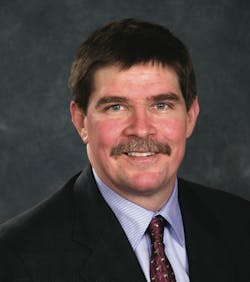Schneider Electric To Push Services
It’s part of a newly launched corporate strategy by which the $13 billion company aims to boost global revenues derived from services to 15 percent or more of total revenues by 2008, up from about 1 percent today, according to Greg Bodenhamer, general manager, industrial applications, for Schneider, in Raleigh, N.C.
The services initiative applies both to Schneider’s automation and controls business, whose brands include Telemecanique and Modicon, and to the electrical distribution side of the business anchored by the Square D brand in the United States. The Modicon name lately has been less prominent in Schneider marketing activities. But the company now has decided to maintain the Modicon brand for use on programmable logic controllers, according to Alain Dedieu, Schneider vice president of marketing for industrial automation and control. Telemecanique, meanwhile, will be the global brand used for automation and control products.
Executives from Schneider’s North American Operating Division for industrial automation laid out these and other plans for a group of trade press editors recently in Raleigh.
Customer-centric
The push into services squares with an effort by Schneider’s North American operations to become more focused on helping manufacturers solve problems, as opposed to simply selling them products, said Nic Gihl, vice president, industrial automation & control, North American Operating Division. “I’ve been in this job for about a year, and one of the things I’ve tried to do is reorient the automation business at Schneider from being a product-oriented business to being a customer-centric business,” Gihl said.
Bodenhamer, who heads up the newly formed engineered solutions and services unit, noted that Schneider has traditionally offered services such as maintenance and support for its hardware products and components. But under the new initiative, the company will also offer extensive higher value-added services, he said.
In some cases, this may involve Schneider working with partners to provide complete manufacturing solutions. “Customers want a one-stop shop,” said Bodenhamer. “They want to go to a partner, to a solution provider, who can give them the hardware, software, integration capabilities and ongoing services that can solve their problems.”
Bodenhamer and other Schneider executives emphasized, however, that the company has no intention of competing with its systems integrators and partners on automation projects. This issue has become a sore spot with systems integrators of some other automation suppliers that have jumped heavily into the services and solutions business. Schneider instead plans to build strong partnerships with integrators and technology suppliers to meet customer needs, executives said.
“What you won’t see from Schneider is us going out and hiring 200 systems engineers to compete with our systems integrators,” said Gihl. “Our partners are really important to us, and we think that there’s a way that we can work together with them and deliver value to our customers that is better than simply saying, ‘Okay, we’re going to take turnkey responsibility for a job, and do it all ourselves,’ like some of our competitors have done.”
Wes Iversen

